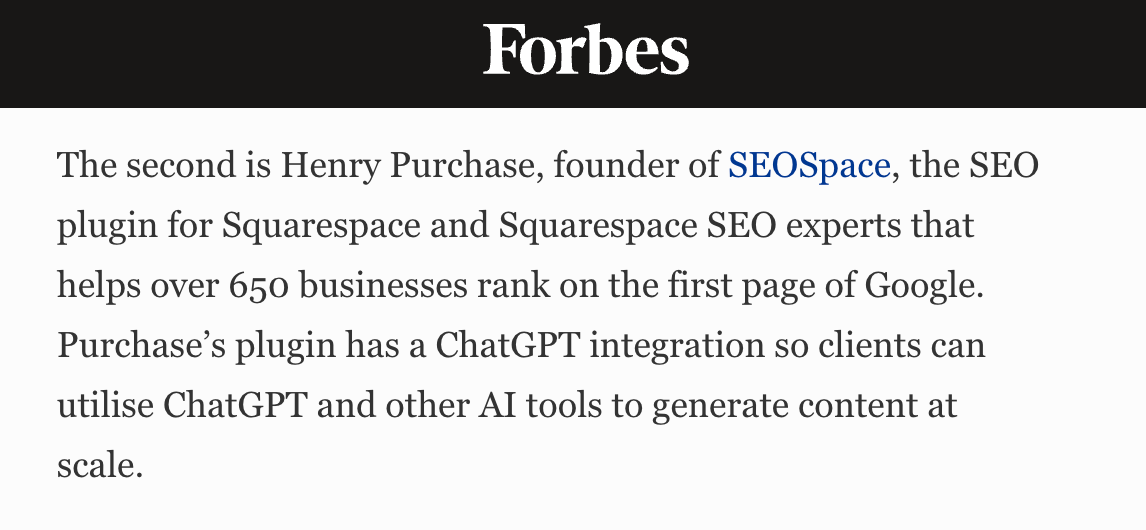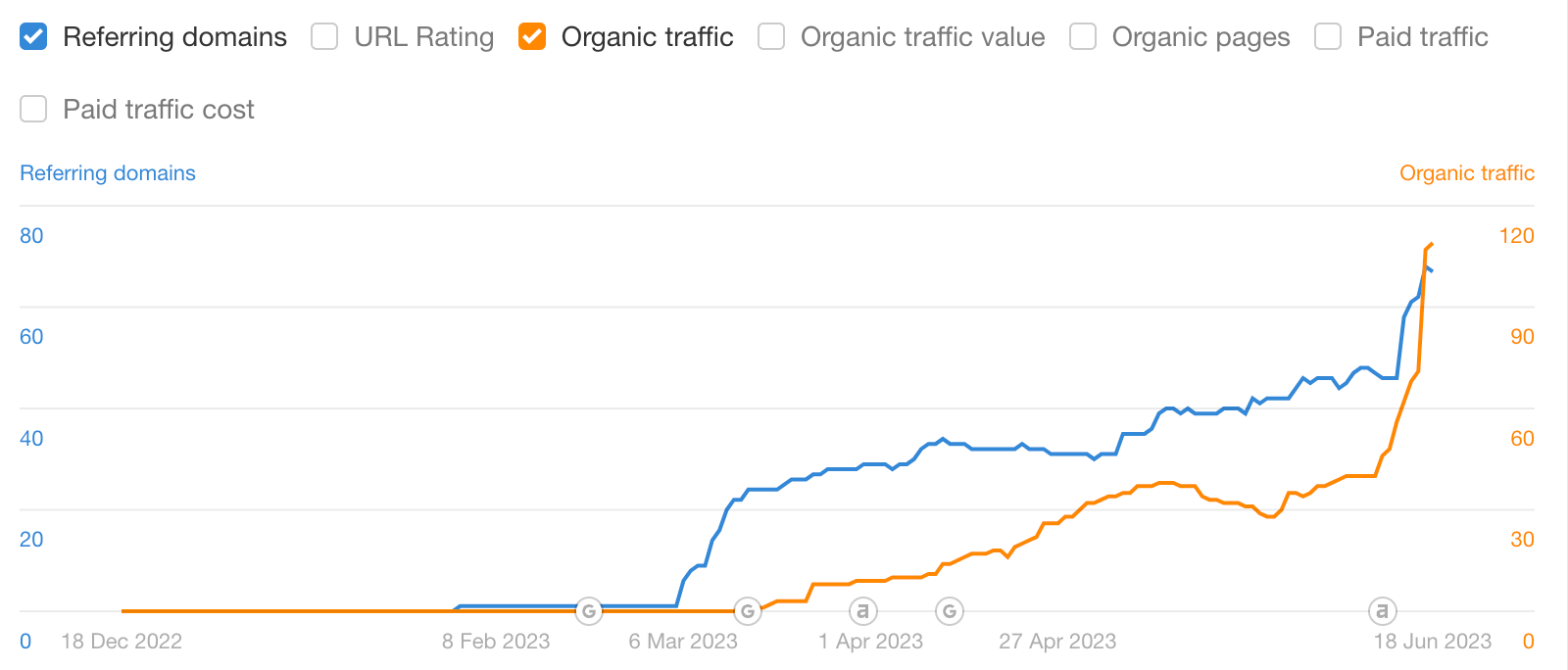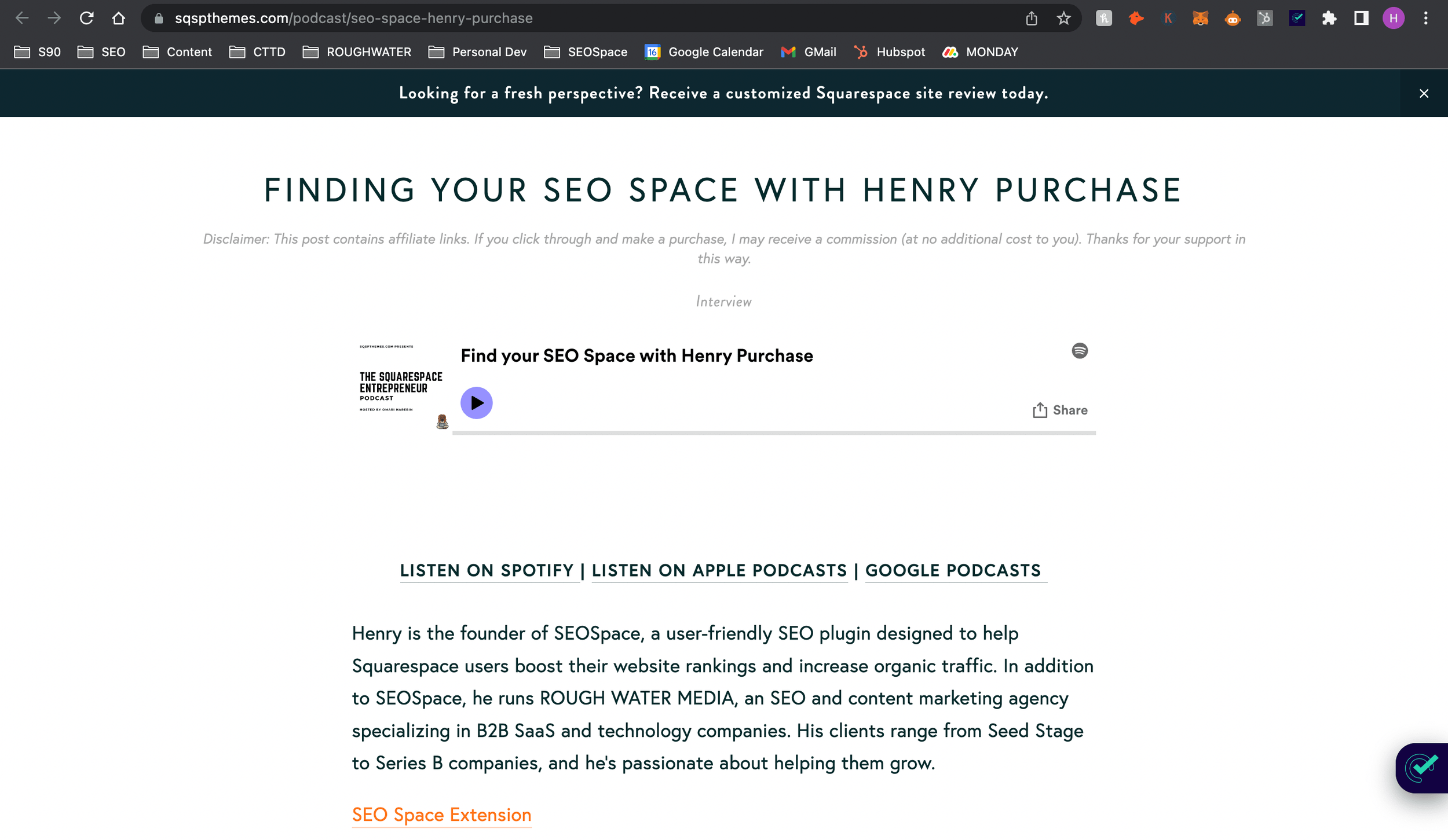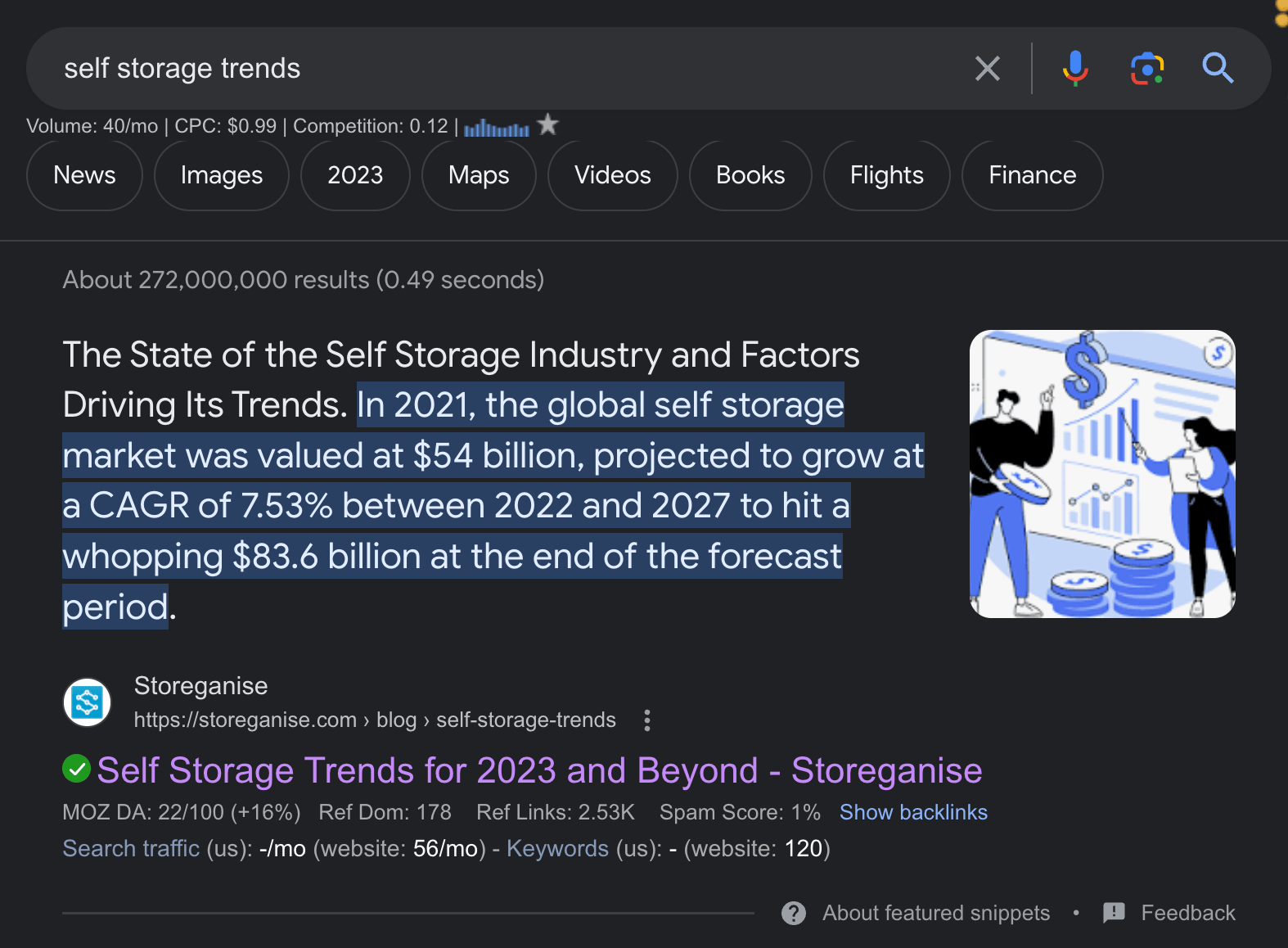What Is Link Building and Why Does It Matter in 2025?
One of the ultimate aims of website owners is to generate viable leads, and an excellent way to achieve this is to drive organic traffic to their websites. The reality is that many website owners struggle with this, with only 15.1% of all Squarespace websites enjoying organic traffic. What's more, only a meager 1.6% of Squarespace websites boast at least 100 monthly organic visits.
This leads to many people asking “what is link building” and how can I use it to get results from SEO?
There's some good news, though. By understanding link-building basics, using effective search engine optimization strategies, seeking advice/help from a Squarespace SEO agency, and avoiding common mistakes, you can rank your website higher on search engines.
This ultimately increases organic traffic and, by extension, leads to your own website. In fact, link building is one major aspect of our 12-point Squarespace SEO checklist for page #1 ranking on Google.
That said, let's look at how mastering the fundamentals of link-building can give you an edge over competitors in 2025 and beyond.
Short Summary
Link building is essential for SEO as it influences search engine rankings, trustworthiness, and organic traffic.
Strategies such as creating valuable content, conducting outreach and relationship building, as well as analyzing competitor backlinks can increase the quality of links.
Regularly monitoring progress helps to optimize link-building strategies and maximize website performance.
What is Link Building: The Basics
Link building is a strategy employed to obtain links from other sites to your website, which can be accomplished by generating great content or employing other tactics, which we’ll discuss later in this post. Basically, it's like getting support from external websites that show search engines that your content has value and deserves referencing.
The result is improved rankings in search results, more trustworthiness and recognition, as well as immense organic traffic growth. This is because, the more high-quality backlinks you have, the higher your domain authority, which impacts how likely you are to rank.
This is something we experienced when we got Forbes (below) - it can be a game changer for businesses.
So how do hyperlinks function exactly?
And what types should you focus on mainly?
Let's delve deeper into the universe of back-linking!
Hyperlinks Explained
Hyperlinks are basically HTML elements employed to facilitate linking between web pages.
A basic hyperlink consists of an anchor tag (the URL) and the visible text (known as anchor text). This versatile element is highly valued in link building because it connects varied websites quickly and easily while allowing users to access other relevant content seamlessly.
Types of Links: Internal vs. External
When it comes to link building, there are two types of links: internal and external.
Internal links connect the pages within a website, allowing users to access its content easily. External links (also known as backlinks), on the other hand, come from different websites and point towards your web pages, which search engines see as a sign that your online presence has trustworthiness.
When applying internal and outbound links to your Squarespace website, it's important to ensure they all point to a functional web page, not "broken" ones. Broken links can negatively affect your website by hampering user experience, slashing website traffic, and hurting overall SEO. In essence, not all links lead to an active web page, so be sure to check out links on your website regularly to avoid broken link building.
On the bright side, when you sign up for our SEO Plugin for Squarespace, you can easily pinpoint those internal and outbound links that are broken and quickly fix them. As you can see below - our plugin identifies broken links!
What is Link Building and the Role of Anchor Text
Anchor text plays a vital role in link building. It refers to the clickable text in a hyperlink that directs users to another webpage. The anchor text provides context to search engines about the linked page's content and helps determine its relevance.
Using descriptive and relevant anchor text improves search engine visibility and user experience when building links. This part of a hyperlink should accurately reflect the linked page's topic and include relevant keywords.
However, it's crucial to maintain a natural balance and avoid over-optimization or keyword stuffing, as search engines value diversity and authenticity. Well-crafted anchor text enhances the credibility and authority of linked pages, contributing to successful link-building strategies. These Squarespace SEO tips outline the best practices for choosing relevant anchor text and hacks to ensure you have well-optimized internal and external links, so consider checking them out.
Tip: Make the anchor text from backlinks variations of the keywords you want to rank for.
The Significance of Link Building for SEO
Link building has a significant impact on SEO as it affects the way search engines rank web pages. Having links from reliable and relevant websites can considerably boost your content's ranking for targeted keywords.
What’s more, link-building helps to create trust and authority in your area of expertise, which leads to elevated levels of organic traffic and improved user experience.
Here, you can see this website’s organic traffic grew proportionally with the number of domains that linked to it - this isn’t a coincidence, as the number of domains is proportional to the domain authority.
This section focuses on the various aspects concerning link building's value when looking at optimization for search engine results.
What is Link Building - Ranking Factors
Search engines like Google rely on links to discover new pages and decide how well they should be positioned on search results pages. The quality (domain authority) and quantity of external websites linking to a page influence how Google ranks it. According to a study by Backlinko, the search result in Google's #1 position boasts 3.8x more backlinks than those in positions #2 to #8.
Google's PageRank algorithm calculates page-worthiness based on incoming hyperlinks. This was vital for its success in becoming one of the major search engine providers today. More connections from high-quality sites that point toward your content will increase your chances of having higher placements within the searches you’re targeting initially.
Trustworthiness and Authority
Link building contributes to making a website more authoritative and trustworthy. As other websites link back to your site, search engines will identify your web page as a reliable source of valuable info which could lead to better search engine rankings and enhanced organic traffic for your business.
Moreover, when you engage in content creation and link building, you can connect with influencers from outside websites that can influence others, enhancing trustworthiness.
FYI, backlinks aren’t the only way to boost your EAT (expertise, authority and trustworthiness) in Google’s eyes - you can also do it via the SEOSpace pyramid, explained below.
Organic Traffic Growth
Link building is an important way to attract more referral traffic, and ensuring your backlinks and internal links get seen by the right people can raise conversion rates. If you run a blog on Squarespace, tailoring content and using strategies such as targeting specific audiences can make customers more likely to take action.
4 Effective Link-Building Strategies
For successful link-building campaigns, it's important to employ approaches to acquire quality backlinks while keeping the process sustainable. And in this section, we'll review several of these tactics.
1. Creating Valuable Content
Link building is essential and high-quality content is vital in this process. Generating unique, relevant information to share with other websites gives your website an opportunity for backlinking. It's also a major criterion Google considers when determining results returned for search queries.
For insightful ideas on what type of material you should use as linkable assets, consider looking into competitors' links to determine the patterns or trends within them. Excellent options are infographics, original research, and guides that offer comprehensive knowledge about particular topics, such as this Squarespace pros and cons post and this WordPress vs. Squarespace SEO comparison guide.
By providing valuable resources, there's a higher potentiality of obtaining highly reliable backlinks, bringing more exposure to your page.
2. Outreach and Relationship Building
Link building is a crucial aspect of any successful plan and an important factor in creating relationships with other websites and influencers. Through outreach activities like connecting to site owners, guest blogging/posting on other websites, and taking advantage of social media, you can gain valuable backlinks while boosting visibility on the web.
As you can see below, SEOSpace has grown friendships with those across the Squarespace industry, which has the benefit of getting backlinks!
SEOSpace featured on SQSP Themes.
Other Squarespace SEO tips for link building include liaising with industry influencers and offering authoritative content on forums like Reddit and Quora.
3. Analyzing Competitor Backlinks
By utilizing tools such as Semrush's Backlink Analytics, you can gain valuable insight into your competitors' link-building strategies. This way, you can uncover opportunities to build links in your niche, learn how others have achieved successful links, understand the overall environment surrounding these types of tactics, and adapt them to your needs.
4. Digital PR and Creating Data-Driven Assets
To amplify link-building efforts, creating data-driven assets and leveraging digital PR is a great strategy. Digital PR allows you to gain high-value editorial links directed toward your website with the help of public relations tactics.
By generating content such as infographics or research studies that contain valuable facts, other websites can become interested in linking to them for reference purposes. This leads to quality backlinks that boost visibility and improve authority online.
Below, you can see an example of this from one of our clients. They rank position 0 for “self storage trends” - when journalists or writers search for stats in the self storage industry, they’re likely to come across this article and potentially link to it!
This led to a link from Yahoo Finance!
Avoiding Common Link Building Pitfalls
Avoiding mistakes when setting up a link-building campaign is key since they can damage a website's reputation. Evaluating the quality of links and balancing follow/nofollow ones are important parts of this process, as we'll see below.
Assessing Link Quality
Ensuring only high-quality links are directed to your website is essential for optimizing search engine rankings and overall online reputation. Evaluating the domain authority of websites that link back to yours should be a priority to maximize the rewards of your link-building efforts and avoid any negative effects from low-quality connections.
To assess such qualities, you must analyze competing backlinks and create engaging content through outreach programs encouraging relationship building. By doing this research and generating meaningful materials, you can secure good-standing links instead of taking risks with inferior ones, guaranteeing successful outcomes in the long run.
Steering Clear of Shady Techniques
It's important to sidestep any dubious link-building tactics, such as getting links from sites with questionable content, buying links, participating in link networks, etc. This will keep links to your website trustworthy and help you avoid penalties from search engines.
Rather than relying on these strategies, concentrate more energy on moral ways of obtaining backlinks, like creating relevant and valuable content, establishing ties with trusted websites, and deploying digital PR to gain exceptional quality backlinks.
Balancing Follow and Nofollow Links
Monitoring the balance between follow and nofollow links is key to sustaining a natural link profile. The dominance of either type could seem unusual, possibly resulting in penalties from search engines that may impact your rankings.
Thus, it's advisable to regularly track backlinks and not overuse illicit tricks for successful outcomes concerning SEO performance.
Monitoring and Measuring Link Building Progress
To guarantee the success of your link-building efforts, it's essential to keep a close eye on and measure its progress. Here, we'll outline various techniques for assessing backlinks, analyzing referral traffic, and adapting your link-building strategy based on findings from keyword research.
1. Tracking Backlinks
It's important to monitor backlinks to assess the potency of your link-building endeavors and optimize search engine standings.
Through utilities like Prowly News Alerts, you can observe any new incoming links, allowing you to discern successful link-building methods while pinpointing strategies that need improvement.
Staying aware of your backlinks helps ensure that efforts to obtain new ones focus mainly on quality leads with pertinent value to augment a website’s online presence and authority within its field.
2. Evaluating Referral Traffic
Analyzing referral traffic is important for improving your link-building efforts and getting the most out of website visits, leads, and sales. To evaluate this type of traffic, one must consider its source, volume of visitors, average time spent on the page, an conversion rate.
By understanding which sources are providing you with successful referral visits, you can refine your link-building strategy to target them better, allowing you to increase the overall results from these tactics.
3. Adjusting Your Link-Building Strategy
It's crucial to fine-tune your link-building tactics by evaluating the quality of links, abstaining from immoral methods, and maintaining a balance between follow and nofollow ones. These steps can help you stay ahead of the competition while maximizing success for your website or business.
What is Link Building - Frequently Asked Questions
Is link building still important?
Yes, link building is still integral to SEO success. Search engines utilize the quality and quantity of links that point to a website as criteria for ranking on search engine results pages (SERPs). Possessing high-quality backlinks can increase chances of appearing higher up SERPs, making link building an essential part of any competitive SEO strategy.
Why do you need link-building services?
Link-building services are a great way to improve the visibility and traffic of your website, providing you with more opportunities for potential customers. Utilizing a professional link-building service will allow you to save time while capitalizing on their specialist skillset and benefit from good quality links connected to your site. This can lead to higher search engine rankings, better brand awareness, and increased web visitors, all key elements in establishing an effective online presence.
Conclusion
In summary, link building is a crucial part of SEO that requires time and effort to succeed. To maximize the benefit of this useful tactic for improving website visibility, authority, trustworthiness, and organic traffic flow, it's imperative to understand its basics and utilize effective strategies to prevent usual mistakes while monitoring progress.
Some key link-building strategies include creating high-quality content, reaching out to potential partners through networking or collaboration initiatives, analyzing backlinks from rivals strategically, and employing digital PR actions plus data-driven link-building resources. And for internal links to web pages on your website as well as outbound links, ensure they're all functional and not broken.
Our revolutionary SEO plugin for Squarespace can help you fish out and fix broken links with a simple scan, improving your overall link-building strategy and SEO game, so consider signing up for free today.
We also offer a free website SEO audit that you can take advantage of today!






